I just finished testing the Veri continuous glucose monitor for the past 28 days, and the results were quite impressive.
Having immediate feedback on how your choices affect your body in real-time can fundamentally change how you think about food.
If you are interested in how your diet and lifestyle affect your blood sugar and insulin response, keep reading to learn why I recommend that you try this device out.
You can get a lot of information in just one month.
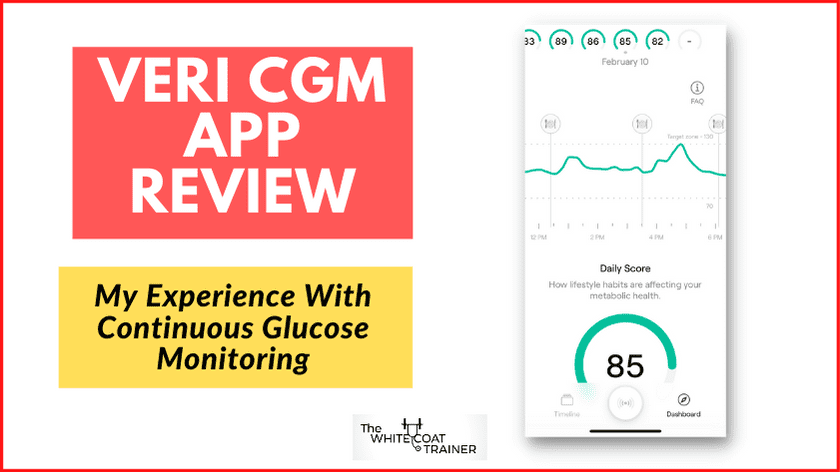
This post may contain affiliate links: meaning we may receive a commission if you use them.
What is Veri Health?
Veri aka Veri Stable is one of the popular continuous glucose monitor brands, including Nutrisense, Levels Health, and January.ai.
The Veri continuous glucose monitor (CGM) is a disposable, one-time-use product designed to measure your glucose levels for 14 days.
The main advantage of the Veri CGM is that it allows you to track your blood sugar level throughout the day without having to prick your finger every time.
As a result, you have access to instant feedback on how your body responds to certain foods and other lifestyle factors right on your smartphone.
I have used the Veri for the past month, and I was so impressed by it that I reached out to them and got a $30 Off discount code for White Coat Trainer readers, which you can get by following this link!
Okay, let’s go into the actual process!
The White Coat Trainer’s Veri Metabolic Review
Overall, the process of ordering, receiving, installing, and using the device was smooth and straightforward.
Here is everything you can expect when you purchase the sensor.
Ordering the Veri
Brittany and I ordered two sensors each on the Veri website. Shortly after purchasing, we received a basic health questionnaire that we had to complete and sent in a picture of our IDs to confirm our identities.
This information is needed because you cannot get a CGM without a doctor’s prescription.
We were approved in less than 24 hours.
Unboxing the CGM
The CGM devices arrived in less than a week in a box that contained two Abbott Freestyle Libre sensors.
The instructions to install the device were really straightforward.
In the box, you get:
- The Freestyle Libre glucose sensor
- The sensor applicator
- Two alcohol swabs
- Two sensor covers
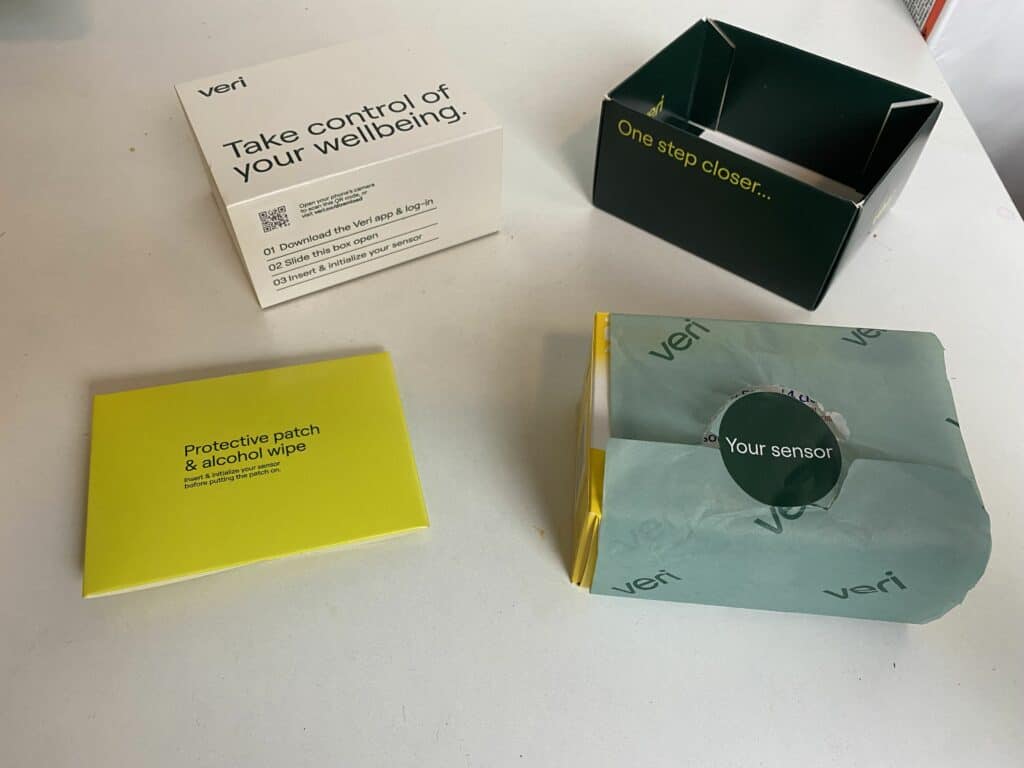
Applying the sensor on your arm
All you have to do is unwrap the Libre sensor cap and unscrew the applicator.
Next, you align the applicator with the sensor and push it down. This part installs the sensor onto the applicator.
Then, wipe the fattiest area on the back of your upper arm with the alcohol swab and apply the sensor by pushing the applicator into your upper arm.
The whole process takes less than 5 minutes.
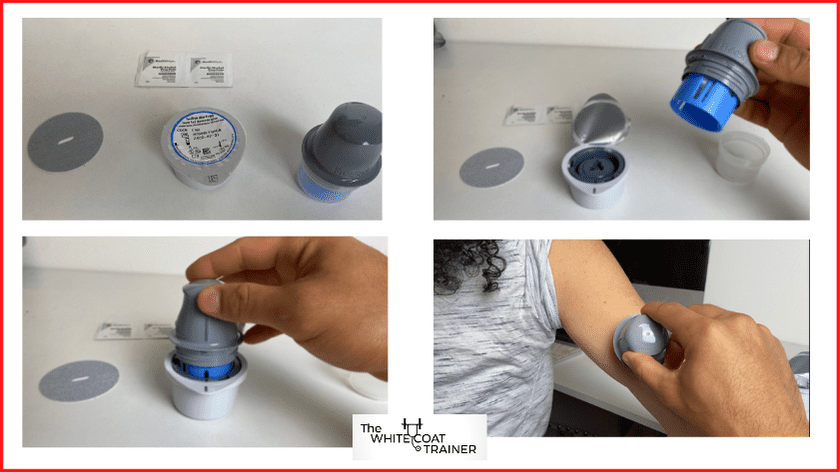
The process is painless.
Here is a short video of what it looks like to place the sensor.
Getting your glucose readings
The next step is to download the Veri app on your smartphone and sign in with the email you used to purchase the device. The app is really clean and easy to use.
To get your glucose reading, all you have to do is scan the sensor with the selfie camera of your smartphone, and you can do this as many times as you want.
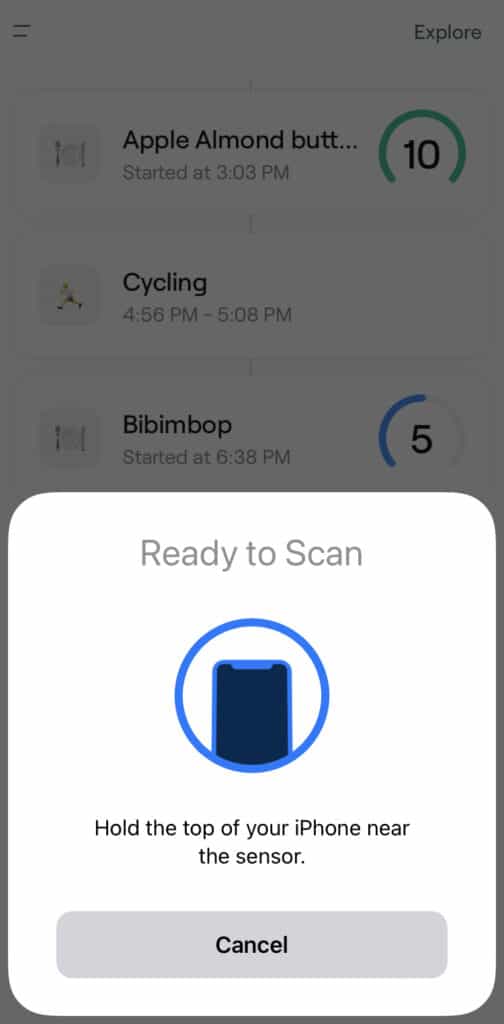
When you first set it up, there is a one-hour calibration process, so don’t expect to get a result right away.
Also, the sensor can only hold up to 8 hours of data, so you have to scan your sensor at least every 8 hours to avoid missing anything.
*Update – since the publishing of this post, you now have to use the Libre Freestyle App to scan your sensor. The data is then immediately transferred to the much cleaner and more user-friendly Veri app.*
Other app features
In addition, the Veri app gives you a “Timeline” view and a “Dashboard” view.
The Timeline allows you to see all your meals, workouts, and sleep durations on one screen. (The app automatically syncs with your other wearables (like an Apple Watch) that track workouts and sleep, but you have to input your meals and when you ate them).
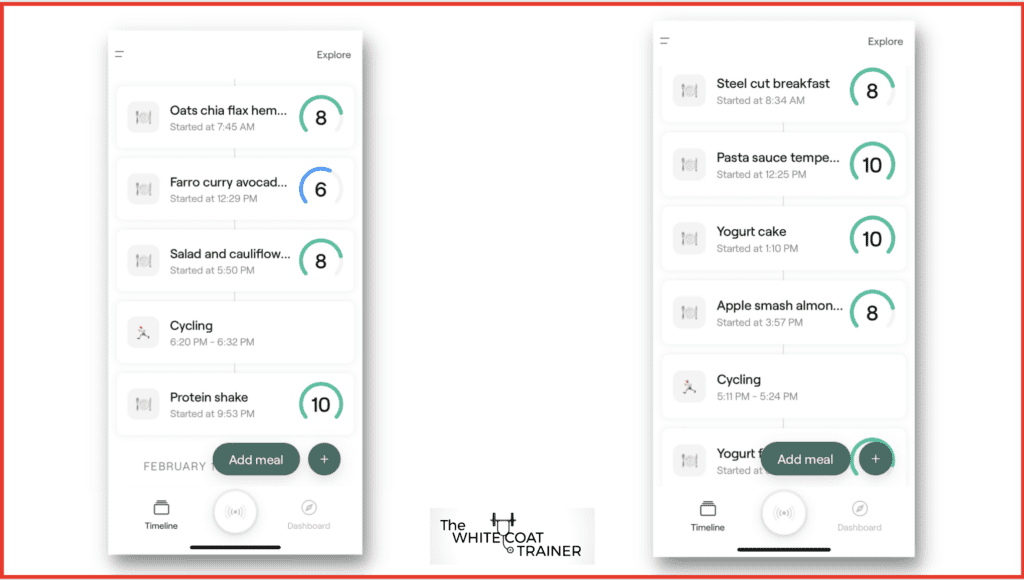
If you don’t have a wearable, you can manually input sleep and exercise.
Each meal is given a metabolic score of 1-10, with a higher score being better, indicating you had less of a glucose spike.
The Dashboard lets you see your glucose level throughout the day in graphical form, and each day is given an overall stability score from 0-100.
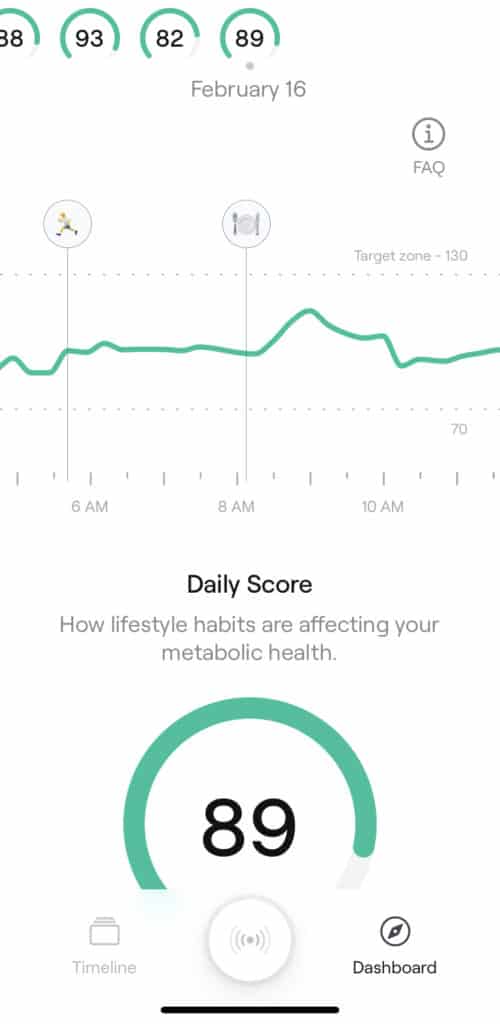
It also has tick marks representing when you ate and exercised.
The other good thing about the Dashboard is that you can set your target ranges of where you want your glucose numbers to be.
What I Learned From Using The Veri CGM (5 Key Takeaways)
I eat a plant-based diet, so naturally, my meals tend to be higher in carbohydrates.
To combat this, I make sure that each meal is combined with a good source of healthy fat and protein.
Overall, the Veri confirmed that my diet is pretty well-balanced in impacting my glycemic response; however, I did make some adjustments.
Here are the key lessons:
If I workout before a meal, my sugar doesn’t spike as high
This makes sense. After a workout, your body uses carbohydrates to immediately replenish its liver and muscle glycogen stores. As such, less glucose ends up in your bloodstream.
Working out before my meal led to ~a 10 point drop in my postprandial glucose levels.
Light movement after a meal also helps control blood sugar spikes
The best advice is to take a 10-minute walk after each meal, particularly a carb-heavy meal. Studies show that a postprandial walk is better at controlling insulin response than a pre-dinner exercise in people with Diabetes. (Study 1) (Study 2)
After a meal, a 10-minute walk (or light indoor cycling) led to a 10-15 point drop in my postprandial glucose levels.
Do your best to eat something with protein at each meal
Protein helps slow down the digestion of your meals. When I eat a carb-heavy meal WITHOUT protein, my postprandial glucose levels are 15 – 20 points higher, as seen in other studies.
Fiber and fat can also help, but not to the effect that protein can, which was true for me as well.
A protein shake by itself never spiked my blood sugar and consistently scored a 10/10 on the app.
Your lifestyle can significantly impact your readings
It shouldn’t come as a surprise that my CGM readings are higher when I don’t sleep as much. I noticed that whenever I slept fewer hours than I was used to, my blood sugar would spike higher the following day to the exact same meal.
I saw as much as a 10 point difference on days where I slept fewer hours than usual.
In addition, stress plays a significant role. Suppose you are having a stressful day at work. In that case, you will notice your baseline glucose levels are higher than average, and your postprandial spikes are higher too.
Last but not least, your sugar can spike depending on the time of day that you’re eating. Eating later in the day can lead to a higher reading than eating the same food earlier in the day.
Your metabolism is unique
Last but not least, your metabolism is unique. You might have a massive rise in your blood sugar after eating a specific type of food but not another.
Your partner might be the complete opposite.
For example, Brittany is Italian and grew up eating pasta for most of her childhood. Can you guess how pasta affects her sugar today?
It doesn’t.
On the contrary, I have a much stronger response when eating the same meal. As a result, I make adjustments since I know how my body reacts to pasta.
Conversely, I tolerate starchy vegetables much more than she does, as I grew up eating these kinds of carbohydrates.
The takeaway here is that everyone is different. Different meals affect people’s blood sugar differently, and there is no one-size-fits-all approach to nutrition.
The Veri CGM can help you establish the optimal diet for YOUR UNIQUE physiology in real time.
The Most Important Takeaway: You Get Actionable Insights
The thing I find most fascinating about a CGM sensor is that it provides you with real-time feedback/data on how your actions are impacting your insides immediately.
The problem with a lot of lifestyle factors is that they don’t have any immediately apparent effects. You likely won’t know how a daily habit affects you until years later.
- You might smoke a cigarette because it feels good at the moment, but you don’t directly see what is truly happening at the cellular level with each inhale.
- You might choose to sleep 4 hours a night because coffee allows you to function for 20 hours per day, but you can’t directly see how the sleep deprivation is affecting your cortisol levels, metabolism, and insulin sensitivity
- You eat junk food because it tastes good, but you are blind to how it affects you on the insides until years later.
If you could somehow visualize in real-time how your actions affect you, maybe you could stop yourself and make a better choice.
A CGM device could potentially be a proxy for giving you the immediate feedback that helps you adhere to lifestyle changes.
Why Does Tracking Your Glucose Matter?
A systematic review and meta-analysis of several prospective studies found a strong association between the postprandial glycemic effects of foods and the development of Type II Diabetes.
Diabetes affects over 30 million people worldwide, and we know that Type II diabetes is largely preventable through lifestyle changes. The worst part is you might already have signs of insulin resistance (or pre-diabetes) and not know it. According to the NIH, approximately 34% of the US population has pre-diabetes.
Seeing how your body reacts to certain foods with real-time feedback can potentially help you make better choices at the moment.
Although these CGM sensors should not be used to diagnose a medical condition, abnormally high levels should raise a flag!
Always speak with your doctor to confirm any concerns.
In addition, large spikes in postprandial glucose are often accompanied by an overcompensation of insulin and a subsequent crash in the following hours.
This could be a contributing factor to why you might:
- feel fatigued throughout the day
- experience waxing and waning energy levels
- feel hungry shortly after eating.
Maintaining a stable sugar level (and in an optimal range) throughout the day can potentially help.
How Does The Veri Work?
The Veri works by placing a very small flexible filament under your skin that measures your interstitial glucose. It looks like a thick piece of hair.
Applying the sensor is painless.
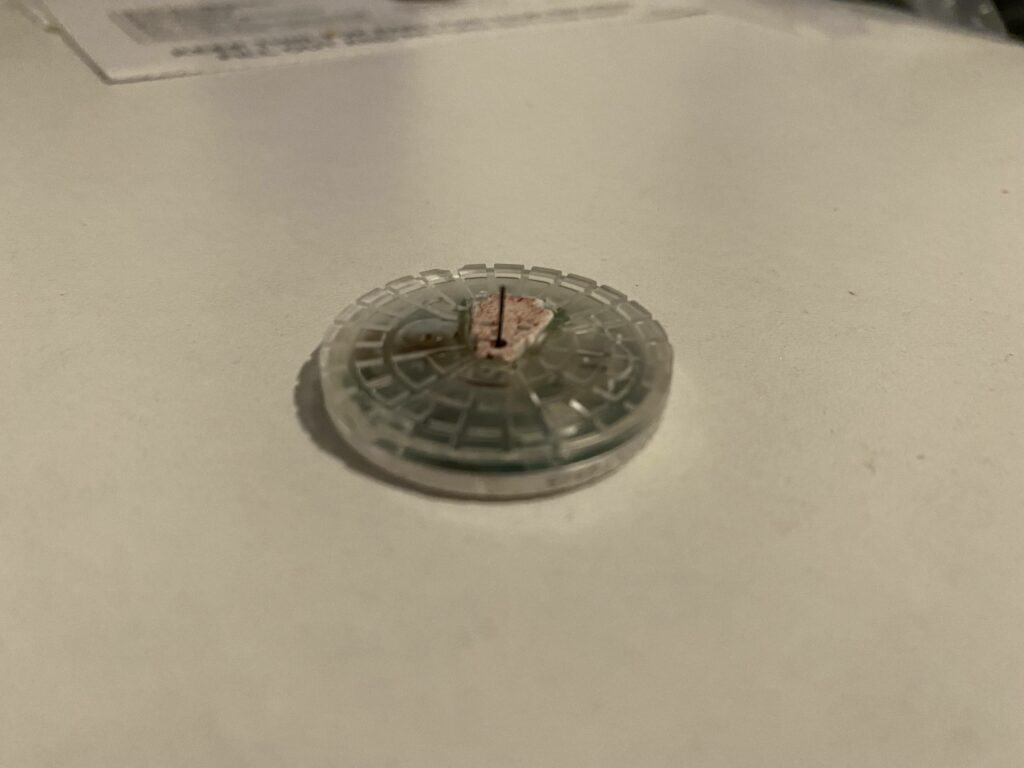
How Accurate is Veri?
The Veri is not 100% accurate, and it’s not meant to be. The Veri is meant to track trends to see the overall changes to your glucose levels in a 24 hour period. In addition, the Veri is checking interstitial glucose levels, which do not rise as quickly as blood glucose levels.
It’s just like a bathroom scale. The actual accuracy of the number on the scale doesn’t matter. The most important thing is to be consistent and always use that scale to track your changes.
Which CGM Does Veri Use?
Veri uses the Abbott Freestyle Libre CGM. It does not yet support the Dexcom G6.
How Much Does the Veri CGM Cost?
At the time of this writing, the Veri costs $299 for a monthly plan and two 14 day sensors, or $139 for four sensors that have to be used within four months. But if you use this link, you will get $30 off your order.
I suggest you order two sensors and cancel or pause the subscription (two sensors are more than enough to get all the info you need).
You can cancel or pause the membership as soon as you get the sensors right from the app, so no need to speak to anyone over the phone.
You can also purchase additional sensors as needed at a reduced rate.
Is Veri Good For Diabetics?
Veri should not be used for people with diabetes or for treating/diagnosing any medical conditions.
The Veri app is only to be used for informational and educational purposes.
Veri CGM Coupon Code
Use the coupon code VSM-WHITECOAT-USD at checkout to get $30 off the Veri CGM sensors use this link to get $30 off.
Overall Verdict On Veri Continuous Glucose Monitoring
CGMs fundamentally change the way you think about the food you put into your body. For the first time, you can get immediately actionable insight into how your choices impact your unique metabolism.
I was very impressed with the easy set-up, clean user interface, and quality of the blood sugar data presented by Veri Health.
Brittany and I enjoyed using the Veri, and we certainly recommend it. If you are interested in learning more about your own metabolic health, give this CGM a try just for a month to have unique insights into how your choices impact your body!
Click here to get $30 off your order (discount shown at the checkout)!
Pros of the Veri
- Seamless ordering and set-up
- Clean and user-friendly app
- Access to 24 hours of real-time data of continuous blood sugar levels
- You can set your desired target range of glucose levels
- Very friendly and responsive customer service team
- Community/forum hosted on Circle to ask questions and interact with other members
- Cost-effective when compared to the other brands like the Levels app
Cons of the Veri
- The first 24 hours of blood sugar readings can be a bit unreliable
- You must scan the Veri at least once every 8 hours to ensure that you get continuous data for a full 24 hours (just scan it before going to bed and as soon as you wake up)
If there is one thing that the Veri CGM will help you do, it is to become more conscious of how your lifestyle choices affect your metabolic health.
To us, it was definitely worth it.
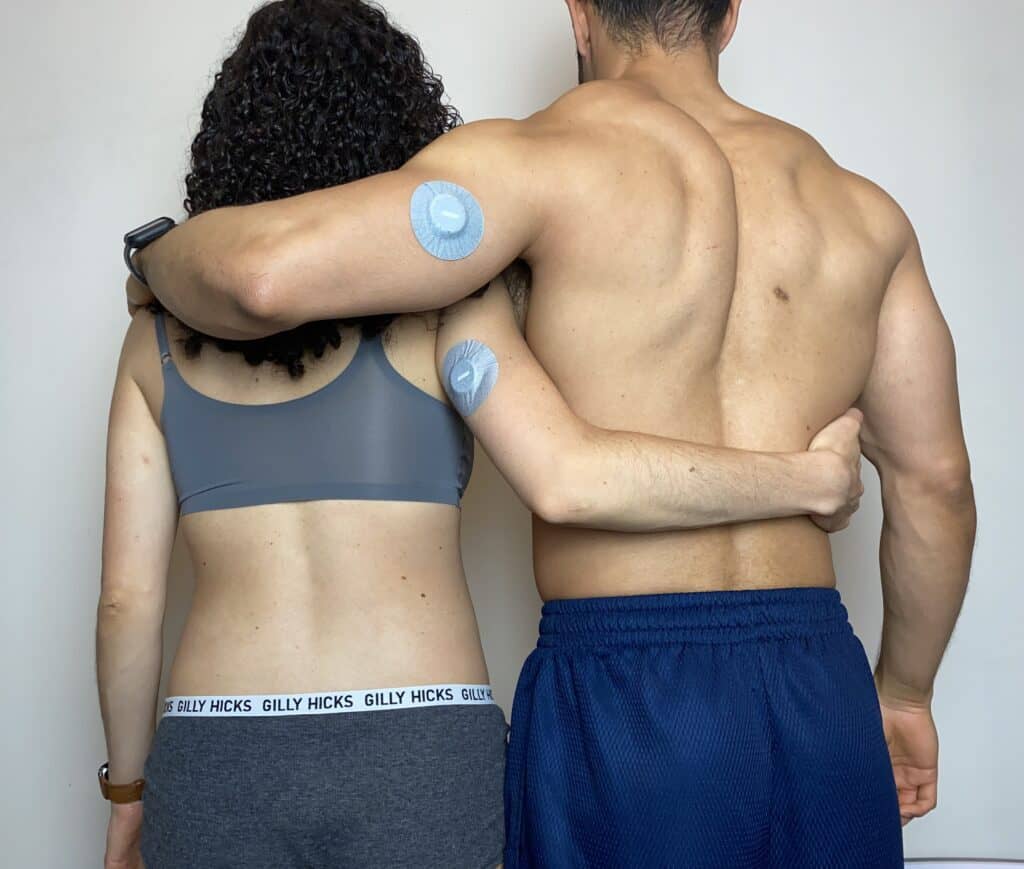

Alex Robles, MD, CPT / Brittany Robles, MD, MPH, CPT
Alex & Brittany Robles are physicians, NASM Certified Personal Trainers, and founders of The White Coat Trainer: a resource dedicated to improving the health and fitness of busy professionals using time-efficient strategies. Their advice has been featured in My Fitness Pal, Prevention, Livestrong, Reader’s Digest, Bustle, The Active Times, and more. Learn more about them here.
